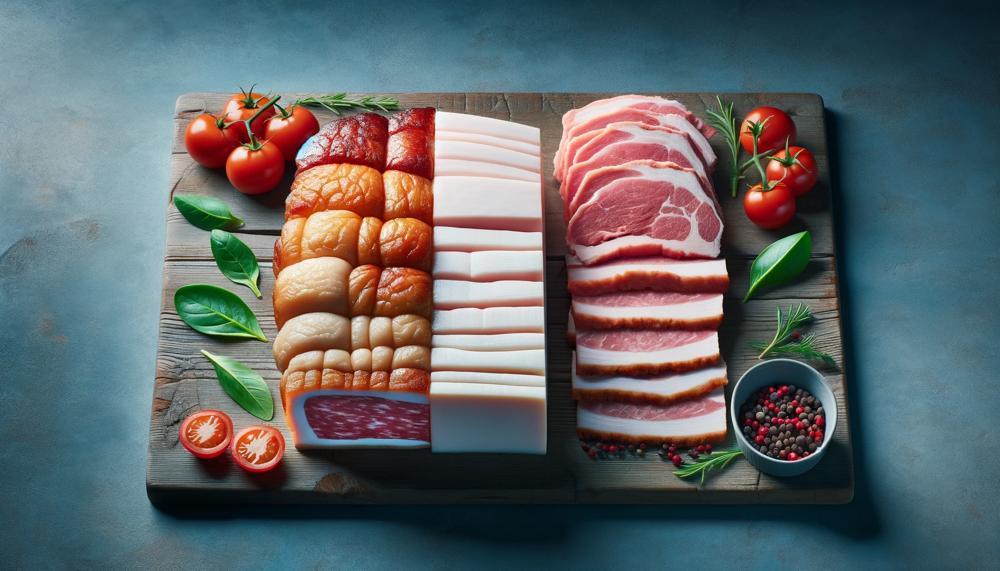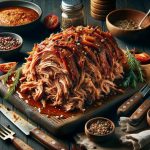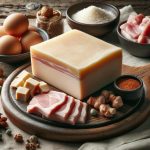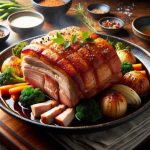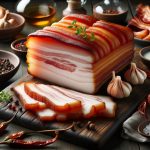For centuries, cooks and food enthusiasts have been fiercely divided on the age-old question: which is better, beef fat or pork fat? The debate rages on, with each side staunchly defending their chosen fat. But in a world where there are no definitive answers, let’s dive into the arguments for and against each type of fat and see if we can come to a conclusion.
So, is beef fat or pork fat better?
Pork fat is generally considered healthier than beef fat. Pork fat contains more unsaturated fats and omega-3 fatty acids than beef and lamb. It’s also a good source of B vitamins and minerals.
So join us as we delve deeper into this never-ending debate and discover all the tasty possibilities that beef fat and pork fat have to offer. Let’s settle this once and for all – or maybe just agree to disagree.
Contents
Beef Fat
Beef fat and pork fat possess distinct qualities that render them suitable for various cooking methods.
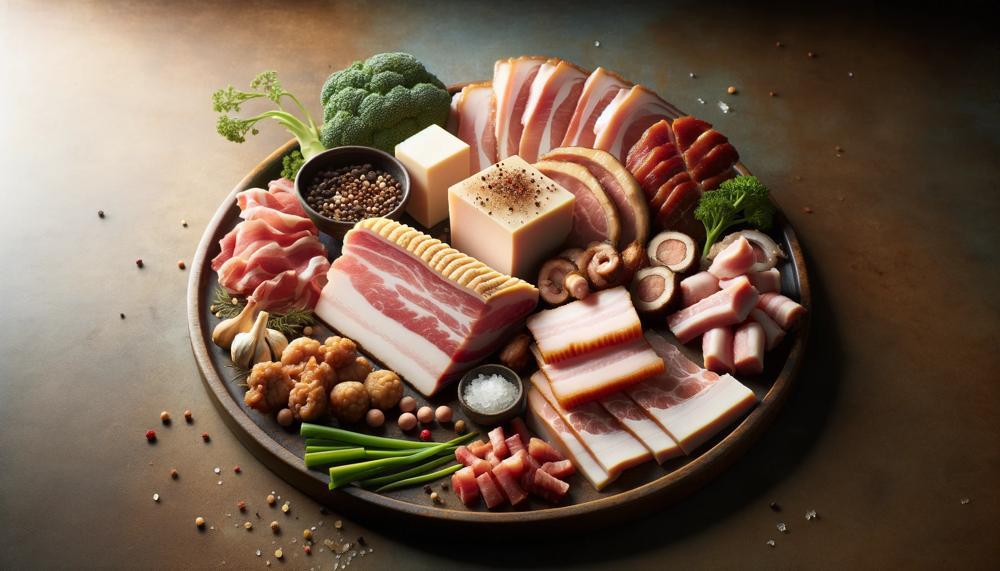
Beef fat has a denser consistency, a higher melting point, and can be stored for extended periods without becoming rancid, making it perfect for creating flaky pastries and deep-frying.
On the other hand, pork fat is typically softer, has a lower melting point, and boasts a slightly sweeter flavor profile, making it ideal for delicate textures in dishes such as pie crusts. Both fats provide essential nutrients but differ in terms of their macronutrient compositions.
Pork Fat
When comparing the nutritional differences between pork fat and beef fat, it’s important to note that each has its own unique composition. While beef fat contains higher levels of saturated fat, pork fat has more monounsaturated fat. This makes pork fat a slightly healthier option for consumption, as monounsaturated fats are believed to be more heart-healthy compared to saturated fats.
However, both types of fat are high in calories and should be consumed in moderation.
To further analyze the nutritional content of pork fat and beef fat, let’s take a look at the following table:
| Pork Fat (1 tbsp) | Beef Fat (1 tbsp) | |
| Calories | 115 | 125 |
| Total Fat | 13g | 14g |
| Saturated Fat | 5g | 6g |
| Monounsaturated Fat | 6g | 7g |
| Cholesterol | 12mg | 14mg |
| Sodium | 0mg | 0mg |
| Potassium | 0mg |
Looking at this comparison, it’s evident that both types of fat have similar nutritional profiles. However, pork fat does have slightly lower amounts of saturated fat and cholesterol. Despite this difference being minimal, it’s still important to consume both fats in moderation as part of a well-balanced diet.
When determining which one is healthier for consumption, it ultimately depends on an individual’s dietary preferences and needs. For those looking to reduce their saturated fat intake, pork fat may be a slightly better option. On the other hand, those following a high-fat or ketogenic diet may consider beef fat to be a healthier choice due to its higher saturated fat content.
Culinary Uses
Beef fat and pork fat are both highly versatile ingredients in the culinary world, each with their own unique flavors and textures. Let’s explore some popular culinary uses for these fats:
Culinary Uses of Beef Fat:
- In British cuisine, suet is commonly used to make traditional dishes like steak and kidney pie.
- Tallow, which is rendered beef fat, is perfect for deep-frying due to its high smoke point.
- Marrow, found in the center of beef bones, is considered a delicacy in fine dining restaurants and is often used to add richness and depth to dishes.
Culinary Uses of Pork Fat:
- Leaf lard, the highest quality type of pork fat, is commonly used in pie crusts for a flaky texture.
- Lard, made from rendered pork fat, is a versatile ingredient that can be used for frying and baking.
- Fatback, the layer of fat on a pig’s back, is often used in Italian charcuterie to add flavor and moisture to cured meats.
When it comes to flavor and texture, beef fat tends to be denser and has a higher melting point compared to pork fat.
This makes it perfect for deep-frying and creating flaky pastries. Meanwhile, pork fat has a softer texture and lower melting point, making it more suitable for delicate applications such as sautéing and pastry dough.
In terms of flavor, beef fat enhances flavors without overpowering them, while pork fat tends to absorb flavors more easily.
Nutritional Comparisons
Both beef and pork fat provide similar amounts of calories, but they differ when it comes to their macronutrient compositions. While beef fat is rich in saturated fat, pork fat contains a higher amount of monounsaturated fat.
It’s worth noting that beef fat is a great source of vitamin D, while both beef and pork fats are rich in vitamin E. Despite having high calorie content, both types of fat offer vital nutrients that are essential for a well-rounded diet.
Beef Fat:
- High in calories
- Rich in saturated fat
- Good source of vitamin D
- Contains vitamin E
Pork Fat:
- High in calories
- Higher in monounsaturated fat compared to beef fat
Flavor Profiles
When it comes to the flavor profiles of beef fat and pork fat, there are noticeable differences in intensity and taste. Beef fat offers a robust, meaty flavor, while pork fat has a slightly sweeter taste that easily absorbs other flavors.
This makes pork fat more versatile in cooking, as it can enhance the flavors of other ingredients.
However, for BBQ purposes, beef fat may be a better option due to its higher smoke point and ability to stay stable under high heat.
Beef Fat Flavor Profile:
Famous for its indulgent and savory flavor, beef fat adds depth and richness to dishes. Its strong meaty taste is attributed to the high levels of saturated fat, which contribute to its distinct flavor.
Additionally, beef fat contains a small amount of monounsaturated and polyunsaturated fats, adding an understated nutty and buttery note to its flavor profile.
Pork Fat Flavor Profile:
In contrast to beef fat, pork fat has a milder flavor. With a subtle sweetness and hints of umami, it is an ideal ingredient for enhancing dishes without overpowering them. The higher levels of monounsaturated fats in pork fat contribute to its softer and more delicate flavor profile.
Which One is Better for BBQ?
The type of fat used in BBQ can significantly impact the overall taste and texture of the dish. In this case, beef fat may be more suitable since it has a high smoke point and can withstand the intense heat of grilling without breaking down or causing flare-ups. Additionally, the robust flavor of beef fat pairs well with smoky BBQ flavors.
However, combining both beef and pork fats can create a balance of flavors in complex dishes like stews or sauces. The two types of fats complement each other well, resulting in a deep and rich flavor profile that enhances the overall dish.
Conclusion
In conclusion, the never-ending debate of whether beef fat or pork fat reigns supreme has been a topic of discussion for centuries. While both have their own unique qualities and can elevate any dish with their deliciousness, the ultimate decision boils down to personal preference and the specific dish being created.
When it comes to health, the nutritional profiles of both fats are similar and should be consumed in moderation as part of a well-rounded diet. However, for BBQ enthusiasts, beef fat may be the better choice due to its higher smoke point and ability to withstand high temperatures without burning.
But let’s not get too caught up in the percentage of calories derived from fat – what truly matters is incorporating healthy sources of fat into our diets.
So let’s embrace the tantalizing possibilities that both beef and pork fat have to offer and remember that moderation is key when indulging in these flavorful ingredients.

